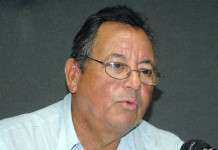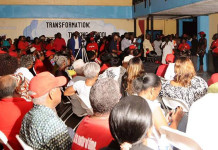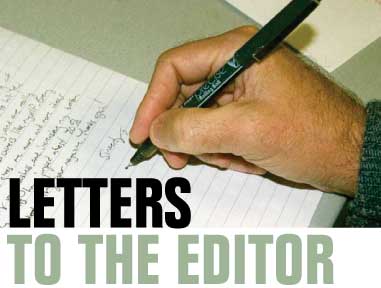letter to the Editor
By: Gladstone”Stone”McEwan
While both Prime Minister Hubert Ingraham and Opposition Leader Perry Christie continue to vilify each other over the breaches in the 2007 elections, four truths emerge which cannot be ignored.
First, the Bahamian electorate’s constitutional rights to privacy continue to be violated, almost six years after the Chief Justice of the Supreme Court, Sir Burton Hall, concluded it to be unconstitutional to attach our voter’s card numbers to our ballots.
Second, the Parliamentary Registration Department is definitely in need of review and adjustment. Third, in the process of resolving the election disputes, more Bahamian voters will join the ranks of the disenfranchised.
Fourth, leaders on both sides of the political divide must assume responsibility for Pinewood and take appropriate and honourable action to ensure that what took place in the 2007 elections is never repeated.
So far the right to privacy for 3719 Bahamian voters in the Pinewood constituency has been violated because how they voted has been traced directly back to them. Additional Bahamians are likely to face the same fate if the court cases relating to the Marco City and Blue Hills constituencies are moved forward. This is not acceptable in a democracy in the 21st century. Positive change cannot prevail when our country’s leaders choose to focus on lambasting each other as opposed to merely conceding that the system needs to be fixed and efforts must now be directed at rectifying the wrongs. Yet, we wonder why some of our youth do not settle their differences in an intelligent, humane and nonviolent manner. Assigning blame is far less important than working collectively to identify and correct the problems plaguing our nation.
The May 2, 2007 elections will go down in history as being the most fraudulent ever in The Bahamas. However, I actually view these events as a blessing in disguise. While I was a lone voice ten years ago when I began to raise concerns about our electoral process, it is gratifying today to hear many additional voices crying out in contempt for fairness and justice. This is also a wake-up call for parliamentarians and other Bahamian leaders to heed the cries of citizens for major reforms to our electoral process and a variety of archaic laws and practices we hold on to for dear life as well as the need to have justice dispensed in an impartial manner.
Personally, I am confident that our Prime Minister and his Cabinet will address the deficiencies in our electoral system and will probably correct many of them. They may also introduce some new procedures and laws. However, if untraceable voting is not included as a pivotal transformation of the current system, then they might as well let it remain as is.
More than band aids are needed to close the underlying civil rights’ wounds and issues which are currently affecting and inhibiting our country’s development.
There are many tried and tested models of election procedures and voter registration systems worldwide that can be reviewed and adapted to reflect the idiosyncrasies of Bahamian society. Because the processes in Canada are very similar to ours, those who wish to become more knowledgeable on this matter may wish to consult the Elections Canada website (http://www.elections.ca). Of particular interest is that the Canadian system has successfully balanced the two values of secrecy (i.e., no vote can be traced to the voter) and privacy/confidentiality (i.e., information collected on electors is used for election purposes only and within the scope for which it was collected) with others such as democracy, accuracy, security, verifiability, transparency, accessibility, neutrality, and simplicity.
Even closer to home, other Commonwealth countries like Jamaica, Trinidad & Tobago, and Guyana, which are more culturally similar to us, pride themselves on having a secret, untraceable ballot. Why then should we, the electorate in The Bahamas, not strive for the same? Why should we not demand the respect and dignity afforded the electorate in nations we claim to be more advanced than?
I urge citizens of The Bahamas and, more so, supporters of the FNM party, to reflect on how all the contestants vying for the coveted leadership position of the FNM in 2001—Mr. Tommy Turnquest, Mr. Tennyson Wells, and Mr. Algernon Allen—all had vast concerns regarding the use of traceable ballots in their leadership contest. They feared that traceable ballots could result in intimidation and thereby prevent delegates from voting their conscience. They feared that traceable ballots could bring about retribution and victimization of delegates who voted for the losers. They feared that the use of traceable ballots would disenfranchise those delegates who preferred to play it safe and not participate rather than risk voting for a losing candidate. They feared the process would make it possible for delegates to sell their votes to the highest bidder because, given that the ballots could be traced, the purchaser could confirm delivery thereby giving the wealthiest candidate an unfair advantage.
Should all Bahamian electors not have these same fears? More importantly, in a democracy which prides itself on fairness and justice, why should the majority be subjected to such trepidation election after election?
While I do not know who in the FNM brought forth the solution that ultimately removed the above-stated fears and worries from the FNM leadership contest, I do commend that fair-minded person/s for recognizing that simply by using untraceable ballots, the negative scenarios could be eliminated and the delegates would be set free to participate in a truly democratic electoral process. The question remains, however, as to why the double standards? Surely, if Hubert Ingraham’s FNM party delegates, supporters, and leaders trust the use of untraceable ballots when selecting their party leaders, they should not fear the use of such a fair and democratic system when the entire country votes to select our ultimate leader.
At the beginning of the PLP’s most recent term in government, I was invited to discuss the merits of an untraceable vote for Bahamians with their newly appointed Constitutional Reform Committee that was co-chaired by Mr. Paul Adderley and Mr. Harvey Tynes, Q C. I conveyed to the committee all the same frightening concerns mentioned in this document. They were also provided with copies of the transcripts of Sir Burton’s historic ruling. I was very disappointed for my people when I received the committee’s final list of recommended amendments to our Constitution to find untraceable voting was not included.
I was most astonished because the inability of our citizens to vote in complete secrecy was deemed unconstitutional by the Chief Justice of the Supreme Court. Moreover, none of the committee’s recommendations were ever scrutinized in our courts.
The blatant and deliberate exclusion of the untraceable vote by some of our country’s most brilliant legal minds from the list of recommendations, confirmed to me that both major political parties were united in denying Bahamians the untraceable vote. The question that remains to be answered is why?
Ironically, the Pinewood fiasco provides Prime Minister Hubert Ingraham, Minister Tommy Turnquest, Mr. Tennyson Wells, Mr. Algernon Allen, and all other FNM delegates who participated in their 2001 leadership contest, a second opportunity to provide us with the same securities and freedoms they gave themselves. It does the same for the leader of the Opposition, Perry Christie, his MPs, and party supporters, as well as the members of The Senate on both sides.
The over 1000 lawyers in The Bahamas, union leaders, educators, and journalists who remained silent on this matter also have a second opportunity to bring this issue to the fore. Last, but not least, are the men and women of God, the clergy who, by grace, are also granted another chance to let their voices be heard in objection to this unconstitutional infringement perpetrated against their congregations in our elections. The time has come for all to be true patriots and to take a meaningful, unified stand to right this obvious wrong that negatively affects us all.
Mr. Algernon Allen, recently returned from political hibernation, reintroduced himself in the January 26, 2008 edition of The Tribune by calling on the government to allow Bahamian citizens to vote on establishing a national lottery. It would be very patriotic and repenting of him to also request that Bahamians be allowed to vote on the implementation of the untraceable ballot in our election process on the same ballot to be used for the lottery decision.
I find it difficult to conceive that anything other than a positive message of unity would be communicated to the Bahamian electorate and to the world at large if our leaders set aside partisan politics to strengthen our democracy.
This would provide our elected leaders with the opportunity to demonstrate their sense of fair play as well as their commitment to the advancement of their people and their country as opposed to themselves.
Bahamians have matured politically and should be rewarded for such. It is also my contention that a very powerful message would be sent by replacing the shackles of traceable ballots with the freedoms made possible by implementing untraceable ones.
The foregoing has been presented not to discredit, blame, or embarrass anyone. I am seeking neither reward nor recognition. I do not have a political agenda or aspirations. I only wish to see at least one more instance of meaningful, positive, and far-reaching sustainable change in our country during my lifetime that will provide the same benefits to all Bahamians, no matter their individual positions in society, as majority rule did in the 1960s. The untraceable vote can deliver this.
In April 2002, the Supreme Court presided over by our Bahamian Chief Justice, Sir Burton Hall, concluded that attaching our voter’s card numbers to our ballots is an infringement of our constitutional right to privacy. While the matter should have ended there, this was not to be. I wish to request the leaders of both the PLP and FNM parties, who are both attorneys, to publicly state to Bahamian voters why they do not agree with the Chief Justice’s ruling. Their answers could provide the country with some understanding as to as to why they so resolutely resist this change. I would also urge that this be undertaken in a public forum to allow different perspectives to be voiced at the same time.
Nonetheless, the past is in the past. Moving forward we need to think of us collectively as one people who are deserving of what is right. When it comes to nation-building issues, there are too few of us to be divided into FNMs and PLPs. Additionally, if the process is unfair, we might as well have no process at all. United we will be more empowered and in a better position to move our country steadily onward.







